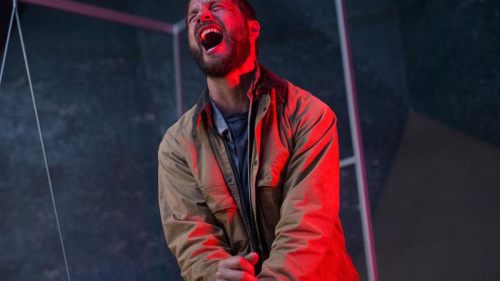INVISIBLE MAN: The Cure For H.G. Wells-Ness
The Invisible Man is almost here. Get your tickets now!
Film composer Benjamin Wallfisch made his solo scoring debut for Thomas Vinterberg with 2005’s Dear Wendy. In the 15 years since his themes and cues have brought dread and elegiac melancholy to the It films; ominous paranoia to A Cure For Wellness; knockabout, Amblin-nostalgic fun to Shazam!; and, with frequent collaborator Hans Zimmer, ethereal, meditative Vangelis-isms to Denis Villeneuve’s Blade Runner 2049. He begins 2020 with The Invisible Man, his first, but he hopes not his last, for writer-director Leigh Whannell.
BMD: You’ve made two films with Andy Muschietti and three with David F. Sandberg: is The Invisible Man the start of a similar working relationship with Leigh?
BW: I hope so. We became good friends in a very short space of time. He’s incredibly funny and brilliant, and he’s also someone who has the confidence to allow his collaborators a huge canvas. He allowed me a lot of scope to go a little bit crazy and encourage really left-field ideas. That’s always a delight, and really exciting because you start challenging yourself. How far can I push this? It was one of the best experiences I’ve had working on a film, a great time. I’d seen Upgrade and I knew his work from the Saw films. He’s a genius, an absolutely masterful filmmaker, and also the sweetest guy. His way of approaching story and character has such impact, and there’s a clarity of the filmmaking style, from the first second right through to the end. That really just makes my job that much easier, because it’s so clear what he’s trying to achieve dramatically.
BMD: So what was the process of composing this? What does invisible sound like?
[Laughs] Well, it was about playing with the rhythm of silence, so that when you hear music it tends to be very extreme and left-field and experimental. It almost creates a ghost of itself when you don’t hear it, and you don’t trust the silence.
The film is quite Hitchcockian in its style, incredibly taut, so I was really keen to make the score feel like an homage to Bernard Herrmann. I wanted it to not feel like was commentating, but that it was really inside the action and part of the world-building. Leigh really wanted that too. We decided to only use a string orchestra, which was in part an homage to the great masterpiece Psycho, by Bernard Herrmann. But it also forces the players to go to their absolute max, because they don’t have the support of a full orchestra. That was a really interesting prospect. Normally we have the luxury of a huge orchestra to spread the load of the narrative weight, as it were. But with just strings it’s that much more intense and close to the audience, in a way.
The sound world for the Invisible Man himself, for Griffin (Oliver Jackson-Cohen), couldn’t be more different from the emotional core of the film, which is Elizabeth Moss’ performance as Cecilia. Hers is one of the greatest performances I’ve even seen from any actor. It’s so visceral and powerful. Everything we do in the score is really from her point of view. She has two themes: a piano theme and also a cello theme which you only hear two or three times.
BMD: Have we heard any of this yet? Is any of your score in the trailers?
BW: No, none of it’s in the trailer, but the album will be coming out very soon; in a week or so, I believe. [The Invisible Man’s soundtrack album was released on February 21.]
BMD: The information the PR sent me says it’s “a hybrid of electronic and classical” – is that accurate?
BW: [Sounding less than impressed with that description] The electronic aspect is entirely for Griffin. We wanted to give his presence something that feels otherworldly and very unsettling. It’s almost like a leitmotif, but not in the traditional way that there’d be a melody. There’s a sound, which starts off as something very gentle and nondescript, but very quickly you realise that it’s there. “Signpost” is the wrong word, but it gives the character some kind of sonic attitude.
BMD: So is the idea that Cecilia has a more “organic” sound and Griffin is more “alien”, for want of a better word?
BW: I think it would be overthinking it to say that. The score was written quite fast, so there was the sense of going with instinct the whole time. Leigh was very clear about the feeling he wanted, and that he wanted something emotional and character-led. That was the thing we had to get right first, for Cecilia. And then when we tackled Griffin it felt obvious to have the polar opposite of that.
BMD: How fast was quite fast? Was it an unusually short process?
BW: Yes, we had about four weeks. It was pretty quick. I came in at the very end of the shooting process. I started by writing a twelve-minute suite of music which had all of the main themes in it, apart from the character themes. The film is so powerful, it grabs you so strongly, it was a joy to write and came quite fast. It was like the film was telling you what it needed. Then we started using some of what we had against picture, and found what worked and didn’t work, and then just very quickly built the score up from there.
BMD: I play piano, and one of the first things I did when I got home from seeing It: Chapter One was download the sheet music for “Every 27 Years”.
BW: Thank you! That took forever to write, that little piano piece, I’ve got to say. So many drafts. It was tricky to get that right. But it was worth it. That was such an amazing movie to be a part of. The Invisible Man has that piano theme for Cecilia I mentioned, so you might be able to play that too, you never know. It’s quite different, obviously. It’s quite an insistent theme. It’s designed to give the feeling of building strength, even in the face of chaos and uncertainty. Cecilia as a character has this incredible strength even though everything around her is going up in flames. She still is able to maintain a modicum of sanity which sees her through to this very cathartic ending.
BMD: Is it hard to come up with something fresh when you work on films in prolific genres like horror and superheroes?
BW: The short answer is yes! I always try to avoid any kind of cliché. I always start any film with a blank canvas, and there’s a mind trick you play on yourself where you try to imagine you have no idea what to do. I keep a completely open mind. I think one of the great joys of this job is that you’re forced to constantly evolve as a creative person, and never get stuck in any particular way of writing. One of the things I love is that a film can bring something out of you that you didn’t know was there, and The Invisible Man was definitely one of those. If it’s a genre film I try to think about, well, what if you look at it as another type of genre? I thought of the It movies very much as an adventure and a coming-of-age story, rather than as a horror film. There’s so much depth, when you think of it like that. For Shazam!, it’s a comedy in the guise of an incredibly exciting action film, and it’s a massive love letter to the classic superhero films from the ‘70s and ‘80s, so the score needed to reflect all those things. So I thought of The Invisible Man as a thriller. It’s very intense and also very emotional, given Elizabeth Moss’ performance. It has that power, and the score had to live up to that performance on an emotional level.
BMD: Did you always want to be a composer for films? Is that where you thought your career in music would go?
BW: I think yes. Since I was a kid I was obsessed with the music of John Williams, like so many of us who grew up in the ‘80s. I distinctly remember seeing ET for the first time as a very young kid, and getting the soundtrack LP and completely destroying it with multiple playing. Those early experiences stay with you: the Star Wars movies, Indiana Jones, Alan Silvestri’s incredible Back to the Future scores, Jerry Goldsmith’s work. That was a period where the orchestra was used in an incredibly operatic and emotional way, and I just ate it up as a kid. I grew up in a family of musicians and trained as a classical musician, spent a lot of years conducting orchestras and concert music, but film music has always been my first love. It was so different from what I was surrounded by as a kid, growing up with professional musicians as parents. The idea that music could be connected to a story and to visuals, couldn’t be further from seeing my dad practice Tchaikovsky a thousand times every morning. There’s an incredible athleticism and perfectionism and craft that goes into that, and that work ethic is very helpful to have observed in terms of being a composer. But I’ve always thought of music as something living and breathing and alive and right now. The urge to make something new definitely annoyed all my piano teachers. I tended to find a particular chord sequence I liked in a Chopin Nocturne or something and then just spend hours playing with that and seeing where it went.
BMD: Did the people around you share your love of film music or were they less impressed? Were they hearing Star Wars and telling you to listen to Holst instead?
No, not at all! My parents were always incredibly encouraging – and still are. The galvanising passion for music that myself and my brother and sister all have… We were just given all these opportunities as kids to be exposed to amazing teachers. My grandfather, Peter, who was a pianist, died when I was 14 but he had a huge impact on me as a kid too. For a long time I wanted to train as a pianist, inspired by him.
Would you still say the piano is “your” instrument?
It is, yeah. It’s the one I can vaguely get around on [laughs]. The piano is the instrument I play every single day, and when I start a score it usually starts with some kind of improvisation on the piano. I’m excited to get my two-year-old a little piano. She’s got little keyboards she loves to play. She’s already showing a lot of interest.
BMD: Well time’s up, thanks very much for talking to us. Just finally… you’re working on Mortal Kombat next?
BW: Yes, we’re just in the process right now. I’m not allowed to tell you anything about that, other than I’m incredibly excited to be a part of it. It’s looking amazing – I can say that, because it’s true!


